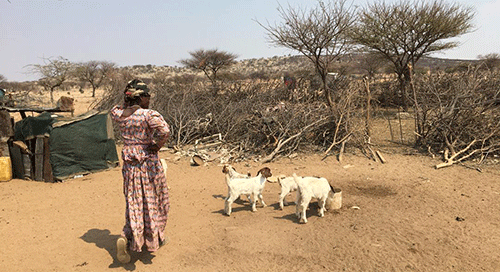Lahja Nashuuta
KALKFELD – Lack of purchasing power, poor road networks, insufficient electricity coverage and water shortage have been attributed to the lack of development in Kalkfeld.
Situated approximately 68km between Omaruru and Otjiwarongo, Kalkfeld has been one of the noted tourist attractions in the country.
The settlement is well-known for the historic dinosaur tracks and other fossil remnants, located at the Otjihaenamparero farmstead, 23 kilometres east of the settlement.
Tourists flock to the area to view and take pictures of dinosaur imprints at the national monument.
However, the settlement has never benefitted fully from this tourism revenue.
In most cases, tourists must be accommodated either in Otjiwarongo or another town in proximity, as there are no accommodation facilities in town.
Kalkfeld is currently being served by one shop, with petrol pumps situated at the entrance of the settlement.
With a population of more than 5 000 inhabitants, the town does not have any automatic teller machines or shopping malls.
There is a primary school, a clinic and a police station.
Marlayn Mbakera, chairperson of the Otjozondjupa regional council, told New Era that there are currently less than 100 people employed in the area.
They are either employed as teachers, nurses or police officers, while an additional four civil servants work for Nampost.
The overcrowded area is lagging in terms of socio-economic development, as there is a lack of access to basic services.
Kalkfeld was proclaimed a village council in 1991. However, in 1996 it was then downgraded to a settlement.
Mbakera revealed that ever since the downgrading, business has been descending, as investors decided to leave the area.
“Ever since the village council was downgraded to a settlement, the living standard of people went down. Unemployment is very high in Kalkfeld, as almost everyone is unemployed “she stated.
Government efforts
Mbakera reiterated government’s commitment to providing infrastructure development and services to residents.
She said ever since the downgrading of Kalkfeld, council has been working unflaggingly to uplift the living standard of the inhabitants.
“The problem is the area is overcrowded by unemployed youth, and there are no economic activities, and purchasing power,” she stressed.
“The office of the regional council has been trying to introduce income-generating projects for residents to sustain themselves. However, none of the projects could materialise”.
“Firstly, the office identified a group of women, and I donated sewing machines to make clothing that they can sell to the residents. While for youth, I have given them chips, cutters and potatoes, welding machines and hair clippers,” she shared.
“Because of the high unemployment rate, businesses were not prospering, as people were taking things on account, while some struggled to find customers,” she said.
“We have introduced a brickmaking project, and the work has already commenced,” she stated.
Mbakera said the brick project intends to supply bricks to the company that will be contracted to construct about 300 low- and middle-income earner houses, which are envisioned for the settlement.
“We have identified people who will be spearheading the project at the cost of more than N$100 000,” she said.
“We are currently servicing the plots, and we intend to make use of bricks from that project, so they have to sell those bricks to the company that will be contracted to build those houses. This is the second month of the business, and they are doing very well”.
There are about 200 plots serviced, which are meant for middle- to low-income groups.
Mbakera emphasised the need for the government to decentralise key officers to the settlement to attract more civil servants and investors.
She revealed the regional council’s plan to introduce farming projects.


